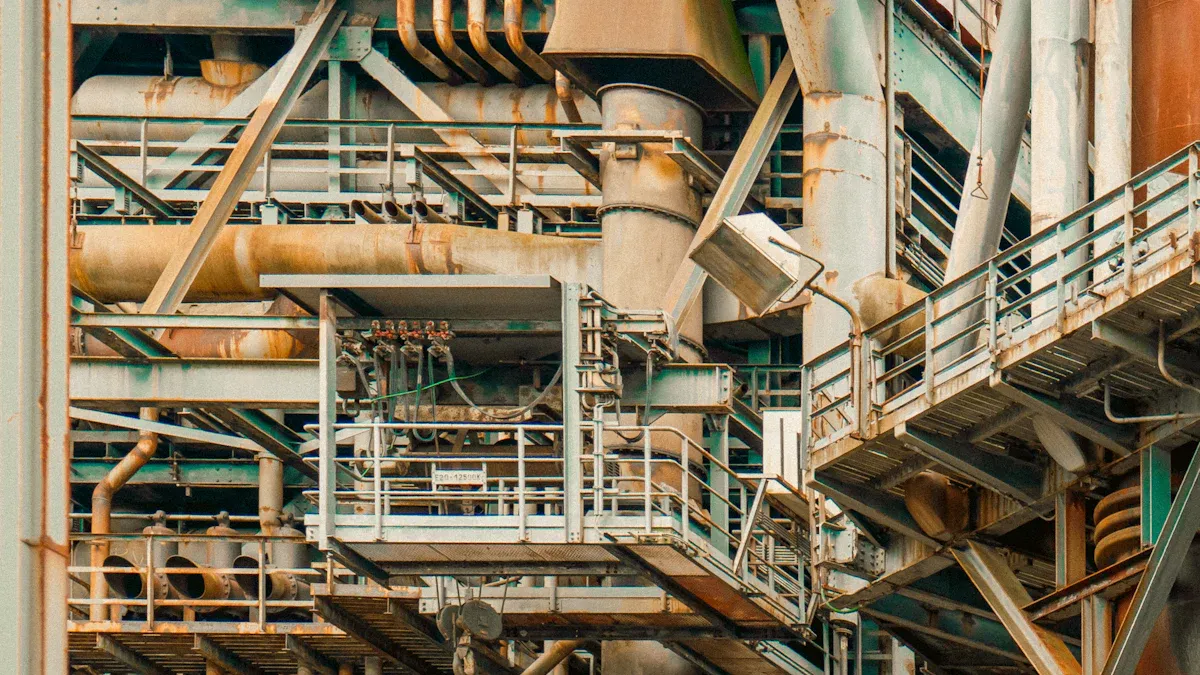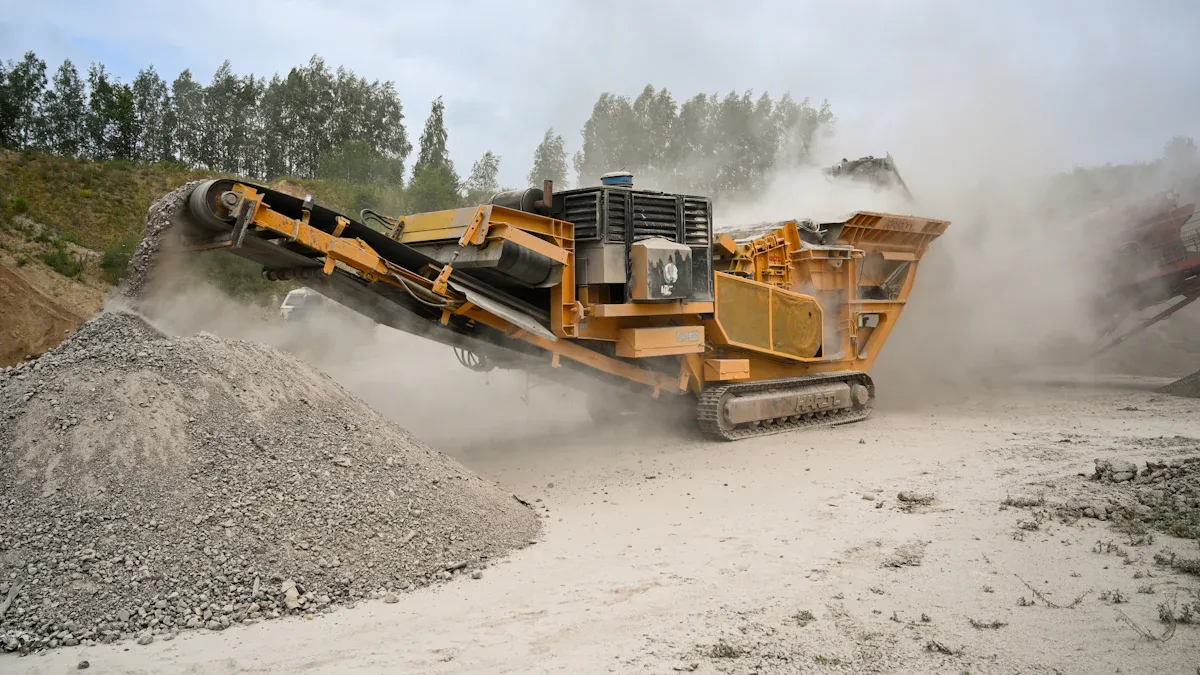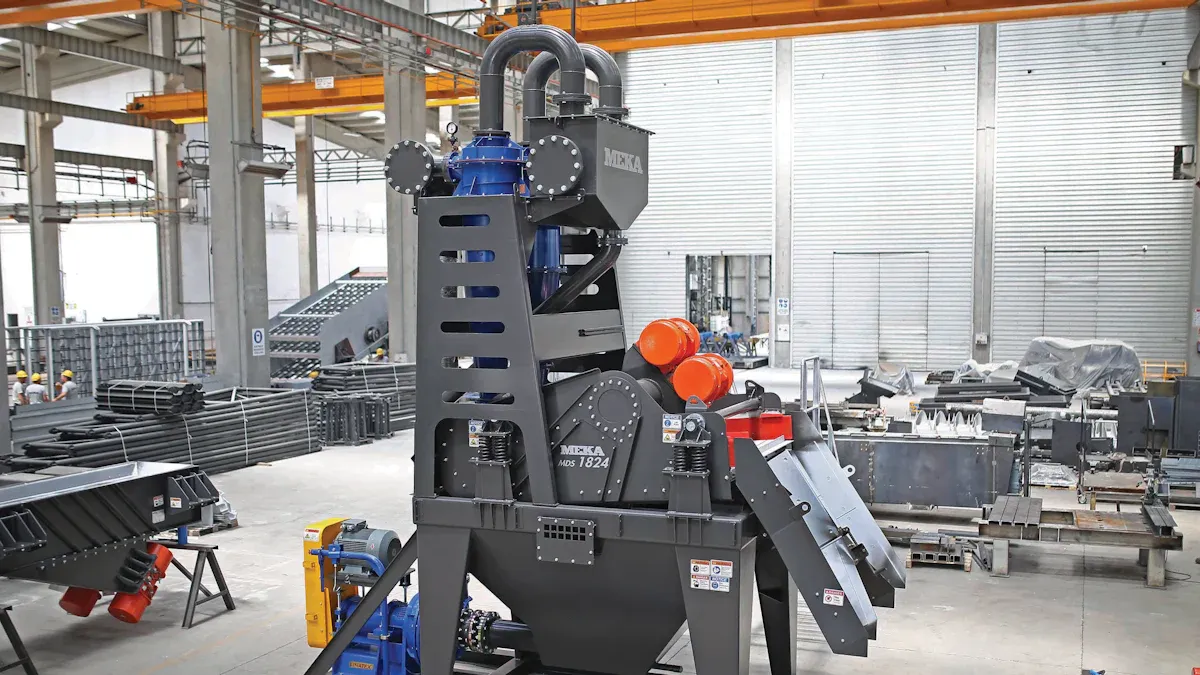
Choosing the right jaw crusher machine is crucial for success in mining and construction. A well-chosen model can enhance operational efficiency and productivity significantly. For instance, the global jaw crusher market is projected to grow from USD 2.02 billion in 2024 to USD 4.99 billion by 2032. This growth reflects the increasing demand for effective crushing solutions, highlighting the key differences among top jaw crusher machines and brands. Additionally, studies show that over 60% of work input in crushing processes is lost due to inefficient designs. Selecting a suitable jaw crusher machine with optimal features, such as a durable manganese jaw plate or high-quality manganese steel plate, can minimize energy loss and improve overall performance. It’s also important to consider the reputation of jaw crusher manufacturers and the availability of impact crusher parts to ensure long-term reliability and efficiency.
Key Takeaways
- Choosing the right jaw crusher boosts efficiency and productivity in mining and construction.
- Model A (PE400×600) is compact, cost-effective, and ideal for various materials, making it a top choice for small operations.
- Model C (KPE Jaw Crusher) offers robust design and easy maintenance, suitable for mining and construction applications.
- Model E (TIANZE Jaw Crusher) handles large volumes efficiently, perfect for mining and building materials.
- Understanding specifications and application suitability helps operators select the best jaw crusher for their needs.
Small Jaw Crushers

Model A Specifications
Model A, known as the PE400×600, stands out in the small jaw crusher category. Its specifications highlight its capabilities and efficiency. The following table summarizes the key technical specifications:
| Model | Max Feeding Size (mm) | Performance | Speed (r/min) | Power (kw) | Overall Dimensions (L×W×H) (mm) | Weight (kg) |
|---|---|---|---|---|---|---|
| PE400×600 | 340 | 40-90 | 10-40 | 275 | 1700×1732×1392 | 7200 |
Model A Advantages
Model A offers several advantages that make it a preferred choice for many operators:
- Compact Design: Its smaller footprint allows for easy installation in tight spaces.
- Versatile Applications: This model can handle a variety of materials, from hard rocks to softer substances.
- Cost-Effective: The PE400×600 provides excellent value for money, making it accessible for small to medium-sized operations.
- Low Maintenance: With fewer moving parts, this model requires less maintenance, reducing downtime and operational costs.
Ideal Use Cases for Model A
Model A excels in various applications, making it suitable for different industries. Here are some ideal use cases:
- Mining: Effective for primary crushing of ores like gold, silver, and copper.
- Construction: Used to crush construction waste and recycle materials such as concrete, bricks, and asphalt.
- Recycling: Processes demolition waste and concrete rubble for easier handling.
Additionally, Model A is particularly suitable for:
- Crushing small quantities of rock and friable materials.
- Handling materials ranging from hard quartz to soft claystone.
- Offering various wear surfaces to accommodate different user needs.
This combination of specifications, advantages, and versatile applications makes Model A a top choice among small jaw crushers in 2025.
Model B Specifications
Model B, known as the PE250×400, is another strong contender in the small jaw crusher category. Its specifications reveal its robust performance and efficiency. The following table summarizes the key technical specifications:
| Model | Max Feeding Size (mm) | Performance | Speed (r/min) | Power (kw) | Overall Dimensions (L×W×H) (mm) | Weight (kg) |
|---|---|---|---|---|---|---|
| PE250×400 | 210 | 5-20 | 300 | 30 | 1400×1300×1200 | 2500 |
Model B Advantages
Model B offers several advantages that make it a popular choice among operators:
- Compact Size: Its smaller dimensions allow for easy transport and installation in limited spaces.
- High Throughput: This model can process a significant amount of material quickly, enhancing productivity.
- Energy Efficient: With a lower power requirement, the PE250×400 reduces operational costs while maintaining performance.
- User-Friendly: The design simplifies operation and maintenance, making it accessible for operators of all skill levels.
Ideal Use Cases for Model B
Model B excels in various applications, making it suitable for different industries. Here are some ideal use cases:
- Laboratories: Perfect for small-scale experiments and material testing.
- Quarries: Efficient for primary crushing of smaller rock types and aggregates.
- Construction Sites: Useful for recycling concrete and asphalt, contributing to sustainable practices.
Additionally, Model B is particularly suitable for:
- Crushing softer materials like limestone and gypsum.
- Handling smaller quantities of material in urban construction projects.
- Providing a reliable solution for small businesses looking to optimize their crushing processes.
The combination of specifications, advantages, and versatile applications makes Model B a top choice among small jaw crushers in 2025.
Medium Jaw Crushers
Model C Specifications
Model C, known as the KPE Jaw Crusher, is a leading choice among medium jaw crushers in 2025. Its specifications reflect its robust design and operational efficiency. The following table summarizes the key technical specifications:
| Feature | Description |
|---|---|
| Frame Construction | Pinned and bolted, non-welded frame construction for durability and reliability. |
| Performance | Proven reliability and performance in over 10,000 applications since 1975. |
| Active Setting Control (ASC) | Optional accessory for enhanced performance in hard applications. |
| Maintenance | Safe and easy to use and maintain. |
| Operating Costs | Maximum productivity with low operating costs. |
Model C Advantages
Model C offers several advantages that make it a preferred option for many operators. The following table highlights these benefits:
| Advantage | Description |
|---|---|
| Simplicity of Design | The KPE Jaw Crusher is designed for efficient and economical production with a rugged construction ideal for crushing operations. |
| Larger Feed Openings | The KPE type features larger feed openings and longer jaws, enhancing its primary crushing capabilities. |
| Easy Adjustments | Equipped with hydraulic shim adjusters, the jaw discharge openings can be changed quickly, minimizing downtime and meeting production requirements effectively. |
Ideal Use Cases for Model C
Model C excels in various applications, making it suitable for different industries. Here are some ideal use cases:
- Mining: Crushing and beneficiation of ores.
- Metallurgy: Crushing metallurgical ores.
- Construction: Producing building materials by crushing stones into aggregates.
- Highways: Infrastructure construction, crushing large stones into specifications.
- Railways: Similar to highways, used in infrastructure development.
- Chemical Engineering: Processing raw materials into required particle sizes for chemical processes.
The combination of specifications, advantages, and versatile applications makes Model C a top choice among medium jaw crushers in 2025. Its design and performance cater to the needs of various industries, ensuring efficient and reliable operations.
Model D Specifications
Model D, known as the KJC503, is a powerful medium jaw crusher designed for versatility and efficiency. Its specifications highlight its robust construction and operational capabilities. The following table summarizes the key technical specifications:
| Feature | Description |
|---|---|
| Max Feeding Size (mm) | 400 |
| Performance | 50-150 tons per hour |
| Speed (r/min) | 300 |
| Power (kw) | 55 |
| Overall Dimensions (L×W×H) (mm) | 2000×1200×1300 |
| Weight (kg) | 3500 |
Model D Advantages
Model D offers several advantages that make it a preferred choice for many operators. Here are some key benefits:
- High Throughput: This model can process a significant amount of material quickly, enhancing productivity.
- Durable Construction: Built with high-quality materials, Model D withstands heavy use and harsh conditions.
- Versatile Applications: It effectively handles various materials, making it suitable for different industries.
- User-Friendly Design: The intuitive controls and easy maintenance features simplify operation for all skill levels.
Ideal Use Cases for Model D
Model D excels in various applications, making it suitable for different industries. Here are some ideal use cases:
- Mining: It efficiently crushes ores and minerals, preparing them for further processing.
- Recycling: This model effectively reduces concrete, asphalt, and other materials into manageable pieces.
- Construction: It serves as a primary crusher, working well with secondary and tertiary processing devices.
Industry experts note that jaw crushers like Model D play a crucial role in mining, recycling, and construction. They effectively reduce materials into sizes that facilitate easier handling and processing. This versatility makes Model D a top choice among medium jaw crushers in 2025.
Large Jaw Crushers
Model E Specifications
Model E, known as the TIANZE Jaw Crusher, is a prominent choice in the large jaw crusher category. Its specifications highlight its robust design and operational capabilities. The following table summarizes the key technical specifications:
| Specification | Details |
|---|---|
| Type | Jaw Crusher |
| Capacity (t/h) | Max. 3t/h |
| Place of Origin | Henan, China |
| Weight | 800 KG |
| Warranty | 1 Year |
| Core Components | Gear, Motor, Bearing, Gearbox, Other |
| Key Selling Points | Long Service Life |
| Color | Customization supported |
| Application | Mining Industry |
| Brand Name | TIANZE |
| Dimension (LWH) | 720660850 |
| Machinery Test Report | Provided |
| Video outgoing-inspection | Provided |
Model E Advantages
Model E offers several advantages that make it a preferred choice for many operators in the industry:
- High Capacity: With a maximum capacity of 3 tons per hour, this model efficiently handles large volumes of material.
- Durable Construction: Built with high-quality materials, Model E withstands heavy use and harsh conditions, ensuring longevity.
- Versatile Applications: This model effectively processes various materials, making it suitable for multiple industries.
- User-Friendly Design: The intuitive controls and easy maintenance features simplify operation for all skill levels.
Ideal Use Cases for Model E
Model E excels in various applications, making it suitable for different industries. Here are some ideal use cases:
- Mining: This model is perfect for coarse and medium crushing of ores, such as iron ore and copper ore.
- Building Materials: It efficiently crushes sand and gravel aggregates for road and railway construction.
- Metallurgy: Model E prepares ores for smelting, ensuring optimal processing.
- Chemical and Water Conservancy: It handles bulk materials in chemical raw materials or water conservancy projects.
Additionally, Model E is particularly effective in:
- Hardrock mining
- Aggregate industry
- Construction waste
- Decorative stone/granite scrap
The heavy-duty jaw crusher market is driven by technological innovation and evolving end-user demands. Leading models like Model E will likely include portable diesel units for remote mining and stationary electric crushers for urban construction. Companies that integrate advanced hardware and predictive analytics are expected to lead the market in 2025. This combination of specifications, advantages, and versatile applications makes Model E a top choice among large jaw crushers in 2025.
Model F Specifications
Model F, known as the C160, is a leading choice in the large jaw crusher category for 2025. Its specifications demonstrate its robust design and high performance. The following table summarizes the key technical specifications:
| Specification | Details |
|---|---|
| Type | Jaw Crusher |
| Capacity (t/h) | Max. 1,600 t/h |
| Max Feeding Size (mm) | 1,000 |
| Power (kw) | 160 |
| Weight (kg) | 45,000 |
| Overall Dimensions (L×W×H) (mm) | 3,200×2,500×2,500 |
Model F Advantages
Model F offers several advantages that make it a preferred choice for operators in heavy industries. Here are some key benefits:
- High Capacity: With a maximum capacity of 1,600 tons per hour, this model efficiently handles large volumes of material.
- Durable Construction: Built with high-quality materials, Model F withstands heavy use and harsh conditions, ensuring longevity.
- Versatile Applications: This model effectively processes various materials, making it suitable for multiple industries.
- User-Friendly Design: The intuitive controls and easy maintenance features simplify operation for all skill levels.
Ideal Use Cases for Model F
Model F excels in various applications, making it suitable for different industries. Here are some ideal use cases:
- Mining Industry: Used to crush large rocks and ores like iron, copper, gold, and silver for further processing.
- Quarrying Industry: Employed to crush stone, concrete, and asphalt for construction projects.
- Construction Industry: Utilized for recycling materials such as concrete and asphalt in road construction and building projects.
- Recycling Industry: Effective in crushing various materials, including electronic waste and construction waste, for recycling.
The combination of specifications, advantages, and versatile applications makes Model F a top choice among large jaw crushers in 2025. Its robust design and high capacity cater to the demanding needs of heavy industries, ensuring efficient and reliable operations.
Key Differences Among Top Jaw Crusher Machines And Brands

Comparison of Specifications
When comparing specifications among top jaw crusher models, several factors stand out. The following table summarizes key specifications for various models:
| Model | Capacity Range (tph) | Feed Size (mm) | Product Size (mm) | Design Highlights | Build Quality Features | Performance Notes |
|---|---|---|---|---|---|---|
| Jaw Crusher EB | Up to 700 | 0 – 1200 | 0 – 200 / 0 – 300 | Optimum speed, large flywheels for throughput | High-grade steel frame, stress-relieved casting | Lower power peaks, >10% longer part service life, uniform wear |
| Jaw Crusher EB Pro | 300 – 1600 | N/A | N/A | Bionics-based design, modular and maintenance-friendly | Compact and robust, patented swing jaw design | Higher durability, reduced service times, absorbs load peaks |
| Jaw Gyratory Crusher Pro | Larger than EB series | Enlarged feed opening | Fine and uniform product | Hydraulic gap adjustment, overload protection | Direct drive with floating shaft, cyclo-palloid gear | Handles bigger feed, higher crushing ratio, larger throughput than EB series |
Summary of Advantages
Each model offers unique advantages that cater to different operational needs. For instance, the Jaw Crusher EB excels in throughput efficiency, while the EB Pro emphasizes durability and ease of maintenance. The Jaw Gyratory Crusher Pro stands out for its ability to handle larger feeds and achieve higher crushing ratios. These distinctions allow operators to select models that align with their specific requirements.
Application Suitability
Selecting the right jaw crusher model depends on various factors. The following table outlines critical factors to consider when assessing suitability for specific applications:
| Factor | Description |
|---|---|
| Material Hardness | The hardness of the material to be crushed affects the choice of crusher type. |
| Desired Output Size | The required size of the crushed material influences the selection of a crusher with adjustable settings. |
| Production Capacity | The amount of material processed in a given timeframe determines the necessary capacity of the crusher. |
| Maintenance and Costs | Long-term costs, including maintenance and energy consumption, impact the overall cost of ownership. |
| Environmental Considerations | Factors like dust suppression and noise levels are crucial for sustainable operations. |
Understanding these key differences among top jaw crusher machines and brands helps operators make informed decisions that enhance productivity and efficiency.
In summary, selecting the right jaw crusher model in 2025 requires careful consideration of several factors. Key points to remember include:
- Performance Metrics: Assess maximum feed size, capacity, and reduction ratio.
- Operating Costs: Evaluate energy consumption and maintenance expenses.
- Technology and Features: Investigate innovative features like hydraulic adjustments.
- Application Suitability: Consider the specific materials and applications for each model.
- Size and Mobility: Determine the need for stationary versus mobile crushers.
Before making a choice, operators should clearly define their operational needs. This includes understanding material types, production capacity, and output requirements. By doing so, they can ensure they select a jaw crusher that meets their unique demands effectively.
FAQ
What is a jaw crusher?
A jaw crusher is a machine that crushes materials using a pair of jaws. One jaw remains stationary while the other moves to crush the material between them. This process reduces large rocks into smaller, manageable pieces.
How do I choose the right jaw crusher model?
To choose the right model, consider factors like material type, desired output size, production capacity, and operational costs. Assessing these factors helps ensure the selected jaw crusher meets specific operational needs effectively.
What maintenance does a jaw crusher require?
Regular maintenance includes checking and replacing wear parts, lubricating moving components, and inspecting for any signs of wear or damage. Proper maintenance ensures optimal performance and extends the lifespan of the jaw crusher.
What materials can a jaw crusher process?
Jaw crushers can process various materials, including hard rocks, ores, concrete, and asphalt. They are versatile machines suitable for mining, construction, and recycling applications.
How does a jaw crusher improve productivity?
A well-chosen jaw crusher enhances productivity by efficiently reducing material size, minimizing downtime, and requiring less maintenance. This efficiency leads to faster processing times and increased output in various applications.
Post time: Oct-13-2025